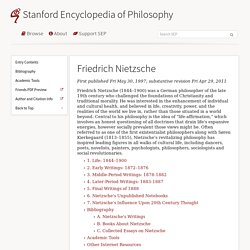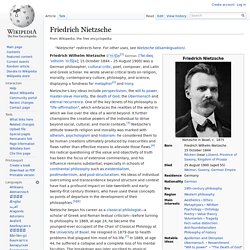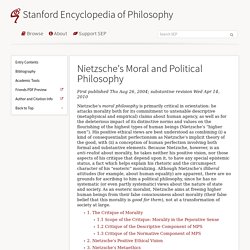

Nietzsche. Friedrich Nietzsche, stanford encylopedia. 1.

Life: 1844–1900 In the small German village of Röcken bei Lützen, located in a rural farmland area southwest of Leipzig, Friedrich Wilhelm Nietzsche was born at approximately 10:00 a.m. on October 15, 1844. The date coincided with the 49th birthday of the Prussian King, Friedrich Wilhelm IV, after whom Nietzsche was named, and who had been responsible for Nietzsche's father's appointment as Röcken's town minister. Nietzsche's uncle and grandfathers were also Lutheran ministers, and his paternal grandfather, Friedrich August Ludwig Nietzsche (1756–1826), was further distinguished as a Protestant scholar, one of whose books (1796) affirmed the “everlasting survival of Christianity.”
When Nietzsche was nearly 5 years old, his father, Karl Ludwig Nietzsche (1813–1849) died from a brain ailment (July 30, 1849) and the death of Nietzsche's two-year-old brother, Ludwig Joseph, traumatically followed six months later (January 4, 1850). 2. 3. 4. 5. 6. 7.
Friedrich Nietzsche, wikipedia. Friedrich Wilhelm Nietzsche (/ˈniːtʃə/[1] or /ˈniːtʃi/;[2] German: [ˈfʁiːdʁɪç ˈvɪlhɛlm ˈniːt͡sʃə]; 15 October 1844 – 25 August 1900) was a German philosopher, cultural critic, poet, composer and Latin and Greek scholar.

He wrote several critical texts on religion, morality, contemporary culture, philosophy and science, displaying a fondness for metaphor[3] and irony. Nietzsche's key ideas include perspectivism, the will to power, the death of God, the Übermensch and eternal recurrence. One of the key tenets of his philosophy is "life-affirmation", which embraces the realities of the world in which we live over the idea of a world beyond. Nietzsche began his career as a classical philologist—a scholar of Greek and Roman textual criticism—before turning to philosophy. In 1869, at age 24, he became the youngest-ever occupant of the Chair of Classical Philology at the University of Basel. As his caretaker, his sister assumed the roles of curator and editor of Nietzsche's manuscripts. Freidrich Nietzsche Research. Nietzsche's Moral and Political Philosophy. 1.

The Critique of Morality 1.1 Scope of the Critique: Morality in the Pejorative Sense Nietzsche is not a critic of all “morality.” He explicitly embraces, for example, the idea of a “higher morality” which would inform the lives of “higher men” (Schacht 1983: 466-469), and, in so doing, he employs the same German word — Moral, sometimes Moralität — for both what he attacks and what he praises.
Moreover, Nietzsche aims to offer a revaluation of existing values in a manner that appears, itself, to involve appeal to broadly “moral” standards of some sort. Yet Nietzsche also does not confine his criticisms of morality to some one religiously, philosophically, socially or historically circumscribed example. Nietzsche believes that all normative systems which perform something like the role we associate with “morality” share certain structural characteristics, even as the meaning and value of these normative systems varies considerably over time.